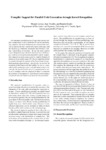Compiler support for parallel code generation through kernel recognition

View/
Use this link to cite
http://hdl.handle.net/2183/23358Collections
- Investigación (FIC) [1580]
Metadata
Show full item recordTitle
Compiler support for parallel code generation through kernel recognitionDate
2004-06-07Citation
M. Arenaz, J. Tourino and R. Doallo, "Compiler support for parallel code generation through kernel recognition," 18th International Parallel and Distributed Processing Symposium, 2004. Proceedings., Santa Fe, NM, USA, 2004, pp. 79-.
Abstract
[Abstract] Summary form only given. The automatic parallelization of loops that contain complex computations is still a challenge for current parallelizing compilers. The main limitations are related to the analysis of expressions that contain subscripted subscripts, and the analysis of conditional statements that introduce complex control flows at run-time. We use the term complex loop to designate loops with such characteristics. We describe the parallelization of sequential complex loop nests using a generic compiler framework (proposed in an earlier paper [Arenaz et al., ICS'2003] ) that accomplishes kernel recognition through the analysis of the gated single assignment program representation. Specifically, we focus on an extension of this framework that enables its use as a powerful tool for gathering source code information that is relevant for the parallelization of each computational kernel. A set of example codes are analyzed in detail to illustrate the potential of our approach. Experimental results using a benchmark suite of complex loop nests are also presented.
Keywords
Kernel
Concurrent computing
Distributed computing
Automatic control
Runtime
Program processors
Information analysis
Data mining
Uncertainty
Classification algorithms
Concurrent computing
Distributed computing
Automatic control
Runtime
Program processors
Information analysis
Data mining
Uncertainty
Classification algorithms
Editor version
Rights
This is a post-peer-review, pre-copyedit version. The final authenticated version is available online at: http://dx.doi.org/10.1109/IPDPS.2004.1303015
ISBN
0-7695-2132-0





